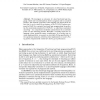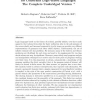1613 search results - page 7 / 323 » Functional and Constraint Logic Programming |
189
click to vote
ICLP
2009
Springer
16 years 7 days ago
2009
Springer
Probabilistic logic programs (PLPs) define a set of probability distribution functions (PDFs) over the set of all Herbrand interpretations of the underlying logical language. When...
PLILP
1994
Springer
15 years 3 months ago
1994
Springer
Abstract. We investigate an extension of a lazy functional logic language, which uses term disequations both in programs and in computed answers. The semantic properties of the lan...
CORR
2004
Springer
14 years 11 months ago
2004
Springer
Logic languages based on the theory of rational, possibly infinite, trees have much appeal in that rational trees allow for faster unification (due to the safe omission of the occ...
114
click to vote
TAP
2010
Springer
14 years 9 months ago
2010
Springer
Program verification systems based on automated theorem provers rely on user-provided axioms in order to verify domain-specific properties of code. However, formulating axioms corr...
ICLP
2009
Springer
15 years 4 months ago
2009
Springer
Abstract. Abductive Logic Programming (ALP) and Constraint Logic Programming (CLP) share the feature to constrain the set of possible solutions to a program via integrity or CLP co...


